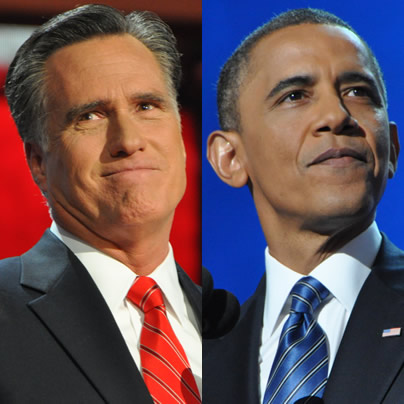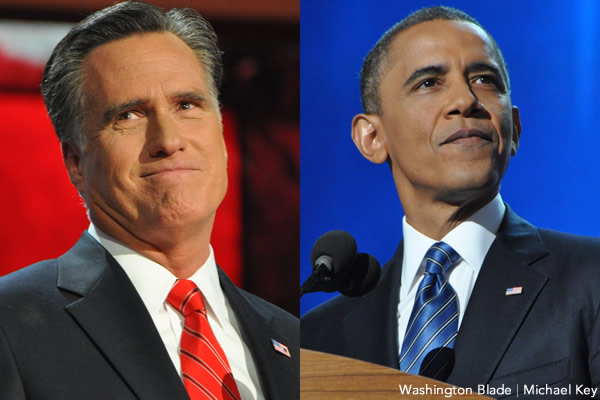National
Aggressive Obama meets passive Romney in foreign policy debate
No mention of LGBT human rights abuses abroad


Republican presidential nominee Mitt Romney and President Obama squared off in a foreign policy debate (Blade file photo by Michael Key)
President Obama and Republican presidential nominee Mitt Romney sparred over foreign policy Monday evening in their final debate and, as in the previous debates, neither candidate made a direct reference to LGBT issues.
During the debate at Lynn University in Boca Raton, Fla., Obama took an aggressive posture, challenging Romney for switching his positions on issues, while Romney appeared passive and agreed with Obama on several key points. Both candidates made explicit references to protecting the rights of women overseas. Romney brought up promoting “gender equity” in the Middle East when talking about U.S. strategy in the Arab world, and Obama said “protecting religious minorities and women” should be a cornerstone of U.S. foreign policy.
Other references to social issues were more general. At one point, Obama mocked Romney for his social policies without naming any position on social issues in particular, saying, “Governor, when it comes to our foreign policy, you seem to want to import the foreign policies of the 1980s, just like the social policies of the 1950s and the economic policies of the 1920s.”
Later, Romney said protecting “human rights” overseas was essential — but didn’t enumerate any groups for which the human rights should be protected.
Jeff Krehely, vice president of LGBT research at the Center for American Progress, said prior to the debate any discussion of LGBT issues would likely have exposed Romney’s ignorance of LGBT human rights abuses overseas.
“It’s pretty clear that Gov. Romney would be an abysmal president for LGBT Americans, since he’s made a political calculation to abandon any support for affirmative LGBT federal rights at home,” Krehely said. “But it would be good for voters to know whether he’s even aware that being gay is actually a punishable crime in many countries, and if he would continue to implement existing U.S. State Department policies that are helping to change that. If he’s not willing to do so, it’s a pretty clear indication of how far right he has drifted and just how badly he wants to be president.”
Turmoil in Syria, where an estimated 30,000 people have been killed under the Assad regime, was a contentious point during the debate. Romney faulted the Obama administration for not taking a leadership role in ousting the dictator, but Obama said the United States organized “Friends of Syria” and is mobilizing humanitarian support. When moderator Bob Scheiffer asked Romney what more he would do in the country, he didn’t commit to any different policy and said he doesn’t think military involvement is appropriate at this time.
Romney also faulted Obama for not placing enough emphasis on the U.S. partnership with Israel and said other countries in the Middle East noticed that Obama didn’t visit Israel when making a trip to the region during an early part of his administration. But Obama recalled that he visited Israel as a candidate and toured the Holocaust museum at Yad Vashem “to remind myself of the nature of evil and why our bond with Israel will be unbreakable.”
The candidates also discussed the appropriate size for the U.S. military. Romney criticized Obama by saying our Navy is smaller now than any time since 1916 and the Air Force is older and smaller than any time since its founding in 1947. Obama responded by saying the military has evolved over time and “we also have fewer horses and bayonets.” The “horses and bayonets” line immediately became an Internet sensation.
Throughout the debate, Romney emphasized the threat of Iran becoming a nuclear power and often spoke about the need to protect U.S. interests abroad by building a strong economy at home. Notably, Romney beyond his opening statement avoided the recent controversy over terrorist attacks at the U.S. consulate in Benghazi, Libya, that resulted in the deaths of four Americans — including U.S. Ambassador Christopher Stevens — despite his earlier attacks on Obama on that issue.
The general consensus of the debate was Obama came out on top. Following the debate, a CBS News poll of debate viewers found that 53 percent believed Obama won compared to 23 percent who gave victory to Romney and 24 percent who said it was a tie.
Many observers said Romney appeared to agree with Obama on much of his foreign policy, including on the issue of drone strikes in Afghanistan when Romney said he supports that move “entirely.” The Washington Post’s Chris Cilliiza wrote Romney, “struggled to differentiate how his foreign policy would offer a break with what Obama has pursued over the past four years.”
Jerame Davis, executive director of the National Stonewall Democrats, said Obama “won tonight’s debate.”
“Mitt Romney is not ready for the world stage, he is not qualified to lead our country, and he has proven time and again he will say anything to get elected,” Davis said. “Americans should not be fooled by a slick sales pitch from an empty suit. President Obama has the stature, temperament, knowledge and vision to be the leader of the free world. Mitt Romney does not.”
Richard Grenell, who’s gay and briefly served as foreign policy spokesperson for the Romney campaign, said the debate revealed the Democratic messaging that Romney isn’t yet prepared to lead the country is false.
“It’s clear the Obama narrative that Gov. Romney is too extreme and naïve on foreign policy issues has imploded,” Grenell said. “They’ve wasted six months and millions of dollars on a message that fell apart tonight. The Obama team has quickly pivoted to start a new narrative that Romney is agreeing with President Obama on foreign affairs. The Obama team is panicking because they sense that the president isn’t going to get re-elected.”
State Department
State Department releases annual human rights report
Antony Blinken reiterates criticism of Uganda’s Anti-Homosexuality Act

Secretary of State Antony Blinken on Monday once again reiterated his criticism of Uganda’s Anti-Homosexuality Act upon release of the State Department’s annual human rights report.
“This year’s report also captures human rights abuses against members of vulnerable communities,” he told reporters. “In Afghanistan, the Taliban have limited work opportunities for women, shuttered institutions found educating girls, and increasing floggings for women and men accused of, quote, ‘immoral behavior,’ end quote. Uganda passed a draconian and discriminatory Anti-Homosexuality Act, threatening LGBTQI+ individuals with life imprisonment, even death, simply for being with the person they loved.”
Ugandan President Yoweri Museveni last May signed the law, which contains a death penalty provision for “aggravated homosexuality.”
The U.S. subsequently imposed visa restrictions on Ugandan officials and removed the country from a program that allows sub-Saharan African countries to trade duty-free with the U.S. The World Bank Group also announced the suspension of new loans to Uganda.
Uganda’s Constitutional Court earlier this month refused to “nullify the Anti-Homosexuality Act in its totality.” More than a dozen Ugandan LGBTQ activists have appealed the ruling.
Clare Byarugaba of Chapter Four Uganda, a Ugandan LGBTQ rights group, on Monday met with National Security Council Chief-of-Staff Curtis Ried. Jay Gilliam, the senior LGBTQI+ coordinator for the U.S. Agency for International Development, in February traveled to Uganda and met with LGBTQ activists who discussed the Anti-Homosexuality Act’s impact.
“LGBTQI+ activists reported police arrested numerous individuals on the basis of their sexual orientation or gender identity and subjected many to forced anal exams, a medically discredited practice with no evidentiary value that was considered a form of cruel, inhuman, and degrading treatment and could amount to torture,” reads the human rights report.
The report, among other things, also notes Ugandan human rights activists “reported numerous instances of state and non-state actor violence and harassment against LGBTQI+ persons and noted authorities did not adequately investigate the cases.”
Report highlights anti-LGBTQ crackdowns in Ghana, Hungary, Russia
Ghanaian lawmakers on Feb. 28 approved the Promotion of Proper Human Sexual Rights and Ghanaian Family Values Bill. The country’s president, Nana Akufo-Addo, has said he will not sign the measure until the Ghanaian Supreme Court rules on whether it is constitutional or not.
The human rights report notes “laws criminalizing consensual same-sex sexual conduct between adults” and “crimes involving violence or threats of violence targeting lesbian, gay, bisexual, transgender, queer or intersex persons” are among the “significant human rights issues” in Ghana.
The report documents Hungarian Prime Minister Viktor Orbán and members of his right-wing Fidesz party’s continued rhetoric against “gender ideology.” It also notes Russia’s ongoing crackdown against LGBTQ people that includes reports of “state actors committed violence against LGBTQI+ individuals based on their sexual orientation or gender identity, particularly in Chechnya.”
The report specifically notes Russian President Vladimir Putin on July 24 signed a law that bans “legal gender recognition, medical interventions aimed at changing the sex of a person, and gender-affirming care.” It also points out Papua New Guinea is among the countries in which consensual same-sex sexual relations remain criminalized.

The Cook Islands and Mauritius in decriminalized homosexuality in 2023.
The report notes the Namibia Supreme Court last May ruled the country must recognize same-sex marriages legally performed outside the country. The report also highlights the Indian Supreme Court’s ruling against marriage equality that it issued last October. (It later announced it would consider an appeal of the decision.)
Congress requires the State Department to release a human rights report each year.
The Biden-Harris administration in 2021 released a memorandum that committed the U.S. to promoting LGBTQ+ and intersex rights abroad.
The full report can be read here.
National
Same-sex couples vulnerable to adverse effects of climate change
Williams Institute report based on Census, federal agencies

A new report by the Williams Institute at the UCLA School of Law finds that same-sex couples are at greater risk of experiencing the adverse effects of climate change compared to different-sex couples.
LGBTQ people in same-sex couple households disproportionately live in coastal areas and cities and areas with poorer infrastructure and less access to resources, making them more vulnerable to climate hazards.
Using U.S. Census data and climate risk assessment data from NASA and the Federal Emergency Management Agency, researchers conducted a geographic analysis to assess the climate risk impacting same-sex couples. NASA’s risk assessment focuses on changes to meteorological patterns, infrastructure and built environment, and the presence of at-risk populations. FEMA’s assessment focuses on changes in the occurrence of severe weather events, accounting for at-risk populations, the availability of services, and access to resources.
Results show counties with a higher proportion of same-sex couples are, on average, at increased risk from environmental, infrastructure, and social vulnerabilities due to climate change.
“Given the disparate impact of climate change on LGBTQ populations, climate change policies, including disaster preparedness, response, and recovery plans, must address the specific needs and vulnerabilities facing LGBTQ people,” said study co-author Ari Shaw, senior fellow and director of international programs at the Williams Institute. “Policies should focus on mitigating discriminatory housing and urban development practices, making shelters safe spaces for LGBT people, and ensuring that relief aid reaches displaced LGBTQ individuals and families.”
“Factors underlying the geographic vulnerability are crucial to understanding why same-sex couples are threatened by climate change and whether the findings in our study apply to the broader LGBTQ population,” said study co-author Lindsay Mahowald, research data analyst at the Williams Institute. “More research is needed to examine how disparities in housing, employment, and health care among LGBT people compound the geographic vulnerabilities to climate change.”
Read the report
Federal Government
Lambda Legal praises Biden-Harris administration’s finalized Title IX regulations
New rules to take effect Aug. 1

The Biden-Harris administration’s revised Title IX policy “protects LGBTQ+ students from discrimination and other abuse,” Lambda Legal said in a statement praising the U.S. Department of Education’s issuance of the final rule on Friday.
Slated to take effect on Aug. 1, the new regulations constitute an expansion of the 1972 Title IX civil rights law, which prohibits sex-based discrimination in education programs that receive federal funding.
Pursuant to the U.S. Supreme Court’s ruling in the landmark 2020 Bostock v. Clayton County case, the department’s revised policy clarifies that discrimination on the basis of sexual orientation and gender identity constitutes sex-based discrimination as defined under the law.
“These regulations make it crystal clear that everyone can access schools that are safe, welcoming and that respect their rights,” Education Secretary Miguel Cardona said during a call with reporters on Thursday.
While the new rule does not provide guidance on whether schools must allow transgender students to play on sports teams corresponding with their gender identity to comply with Title IX, the question is addressed in a separate rule proposed by the agency in April.
The administration’s new policy also reverses some Trump-era Title IX rules governing how schools must respond to reports of sexual harassment and sexual assault, which were widely seen as imbalanced in favor of the accused.
Jennifer Klein, the director of the White House Gender Policy Council, said during Thursday’s call that the department sought to strike a balance with respect to these issues, “reaffirming our longstanding commitment to fundamental fairness.”
“We applaud the Biden administration’s action to rescind the legally unsound, cruel, and dangerous sexual harassment and assault rule of the previous administration,” Lambda Legal Nonbinary and Transgender Rights Project Director Sasha Buchert said in the group’s statement on Friday.
“Today’s rule instead appropriately underscores that Title IX’s civil rights protections clearly cover LGBTQ+ students, as well as survivors and pregnant and parenting students across race and gender identity,” she said. “Schools must be places where students can learn and thrive free of harassment, discrimination, and other abuse.”
-

 South America4 days ago
South America4 days agoDaniel Zamudio murderer’s parole request denied
-

 Maryland5 days ago
Maryland5 days agoMontgomery County police chief discusses arrest of trans student charged with planned school shooting
-

 Commentary5 days ago
Commentary5 days agoWorld ‘isn’t much different today’
-

 State Department18 hours ago
State Department18 hours agoState Department releases annual human rights report











